exam questions with answer ,class notes
EXCELLENT HOMEWORK HELP AND TUTORING ,ALL KIND OF QUIZ AND EXAMS WITH GUARANTEE OF A
Am an expert on major courses especially; psychology,Nursing, Human resource Management and Mathemtics Assisting students with quality work is my first priority. I ensure scholarly standards in my documents and that's why i'm one of the BEST GOLD RATED TUTORS in STUVIA. I assure a GOOD GRADE if you will use my work.
- 203
- 0
- 1
Community
- Followers
- Following
201 items
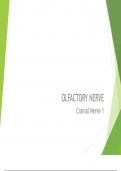
Cranial Nerve 1OLFACTORY NERVE
Cranial Nerve 1OLFACTORY NERVE Classification Olfactory nerve is part of autonomic nervous system. It is a special somatic afferent nerve . This is the shortest sensory nerve in the human body. This nerve is divided into: a) b) Lateral :located in superior nasal concha Medial :located along nasal septum
- Class notes
- • 9 pages •
Cranial Nerve 1OLFACTORY NERVE Classification Olfactory nerve is part of autonomic nervous system. It is a special somatic afferent nerve . This is the shortest sensory nerve in the human body. This nerve is divided into: a) b) Lateral :located in superior nasal concha Medial :located along nasal septum
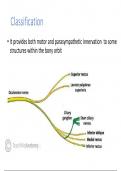
cranial nerve 3
Classification • It provides both motor and parasympathetic innervation to some structures within the bony orbit
- Class notes
- • 4 pages •
Classification • It provides both motor and parasympathetic innervation to some structures within the bony orbit
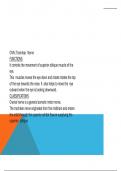
CNIV; Trochlear Nerve
CNIV; Trochlear Nerve FUNCTIONS It controls the movement of superior oblique muscle of the eye. This muscles moves the eye down and rotate rotates the top of the eye towards the nose. It also helps to move the eye outward when the eye is looking downward. CLASSIFICATIONS Cranial nerve is a general somatic motor nerve. The trochlear nerve originates from the midbrain and enters the orbit through the superior orbital fissure supplying the superior oblique
- Class notes
- • 7 pages •
CNIV; Trochlear Nerve FUNCTIONS It controls the movement of superior oblique muscle of the eye. This muscles moves the eye down and rotate rotates the top of the eye towards the nose. It also helps to move the eye outward when the eye is looking downward. CLASSIFICATIONS Cranial nerve is a general somatic motor nerve. The trochlear nerve originates from the midbrain and enters the orbit through the superior orbital fissure supplying the superior oblique

glossopharyngael nerve
It is also known as the ninth cranial nerve ,cranial nerve IX or simply CN IX ,is a cranial nerve that exits the brainstem from the sides of the upper medulla ,just anterior (closer to the nose) to the vagus nerve . Being a mixed nerve (sensorimotor),it carries afferent sensory and efferent motor information . The motor division of the glossopharyngael nerve is derived from the basal plate of the embryonic medulla oblangata, whereas the sensory divion originates from the cran...
- Class notes
- • 7 pages •
It is also known as the ninth cranial nerve ,cranial nerve IX or simply CN IX ,is a cranial nerve that exits the brainstem from the sides of the upper medulla ,just anterior (closer to the nose) to the vagus nerve . Being a mixed nerve (sensorimotor),it carries afferent sensory and efferent motor information . The motor division of the glossopharyngael nerve is derived from the basal plate of the embryonic medulla oblangata, whereas the sensory divion originates from the cran...
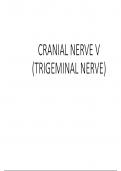
CRANIAL NERVE V (TRIGEMINAL NERVE)
CRANIAL NERVE V (TRIGEMINAL NERVE) TRIGEMINAL NERVE • Cranial nerve v is both sensory and motor nerve. • It is divided into three main branches:-Ophthalmic(v1)-Maxillary(v2)-mandibular(v3
- Class notes
- • 5 pages •
CRANIAL NERVE V (TRIGEMINAL NERVE) TRIGEMINAL NERVE • Cranial nerve v is both sensory and motor nerve. • It is divided into three main branches:-Ophthalmic(v1)-Maxillary(v2)-mandibular(v3
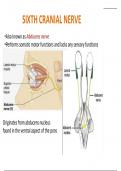
SIXTH CRANIAL NERVE
SIXTH CRANIAL NERVE •Also known as Abducens nerve •Performs somatic motor functions and lacks any sensory functions Originates from abducens nucleus found in the ventral aspect of the pons The trochlear nerve , oculomotor nerve and abducens nerve work together to control eye movements Functions Sends signals to the lateral rectus muscle of the eye which
- Class notes
- • 6 pages •
SIXTH CRANIAL NERVE •Also known as Abducens nerve •Performs somatic motor functions and lacks any sensory functions Originates from abducens nucleus found in the ventral aspect of the pons The trochlear nerve , oculomotor nerve and abducens nerve work together to control eye movements Functions Sends signals to the lateral rectus muscle of the eye which
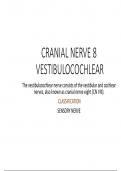
CRANIAL NERVE 8 VESTIBULOCOCHLEAR
CRANIAL NERVE 8 VESTIBULOCOCHLEAR The vestibulocochlear nerve consists of the vestibular and cochlear nerves, also known as cranial nerve eight (CN VIII). CLASSIFICATION SENSORY NERVE members: NS201/109963/22 NS201/109949/22
- Class notes
- • 5 pages •
CRANIAL NERVE 8 VESTIBULOCOCHLEAR The vestibulocochlear nerve consists of the vestibular and cochlear nerves, also known as cranial nerve eight (CN VIII). CLASSIFICATION SENSORY NERVE members: NS201/109963/22 NS201/109949/22
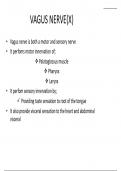
VAGUS NERVE(X)
VAGUS NERVE(X) • Vagus nerve is both a motor and sensory nerve • It perfoms motor innervation of; Palatoglossus muscle Pharynx Larynx • It perfom sensory innervation by; Providing taste sensation to root of the tongue • It also provide visceral sensation to the heart and abdominal visceral FUCTIONS OF VAGUS NERVE Regulate internal organs functions such as; Digestion Heart rate Respiratory rate Vasomotor activity Reflex a...
- Class notes
- • 5 pages •
VAGUS NERVE(X) • Vagus nerve is both a motor and sensory nerve • It perfoms motor innervation of; Palatoglossus muscle Pharynx Larynx • It perfom sensory innervation by; Providing taste sensation to root of the tongue • It also provide visceral sensation to the heart and abdominal visceral FUCTIONS OF VAGUS NERVE Regulate internal organs functions such as; Digestion Heart rate Respiratory rate Vasomotor activity Reflex a...
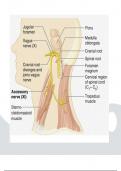
Cranial components
The spinal components These fibers coalesce to form the spinal part of the accessory nerve which runs superiorly to enter the cranial cavity via the foramen Magnum. The nerve traverse the posterior cranial fossa to reach the jugular foramen. It briefly meets the cranial portion of the accessory nerve before exiting the skull (along With the glossopharyngeal and vagus nerve) Cranial components
- Class notes
- • 9 pages •
The spinal components These fibers coalesce to form the spinal part of the accessory nerve which runs superiorly to enter the cranial cavity via the foramen Magnum. The nerve traverse the posterior cranial fossa to reach the jugular foramen. It briefly meets the cranial portion of the accessory nerve before exiting the skull (along With the glossopharyngeal and vagus nerve) Cranial components
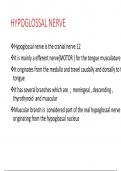
HYPOGLOSSAL NERVE
HYPOGLOSSAL NERVE Hypoglossal nerve is the cranial nerve 12 It is mainly a efferent nerve{MOTOR } for the tongue musculature It originates from the medulla and travel caudally and dorsally to the tongue It has several branches which are ; meningeal , descending , thyrothyroid and muscular Muscular branch is considered part of the real hypoglossal nerve originating from the hypoglossal nucleus FUNCTIONS OF THE HYPOGLOSSAL NERVE Descending branch carries in...
- Class notes
- • 7 pages •
HYPOGLOSSAL NERVE Hypoglossal nerve is the cranial nerve 12 It is mainly a efferent nerve{MOTOR } for the tongue musculature It originates from the medulla and travel caudally and dorsally to the tongue It has several branches which are ; meningeal , descending , thyrothyroid and muscular Muscular branch is considered part of the real hypoglossal nerve originating from the hypoglossal nucleus FUNCTIONS OF THE HYPOGLOSSAL NERVE Descending branch carries in...
